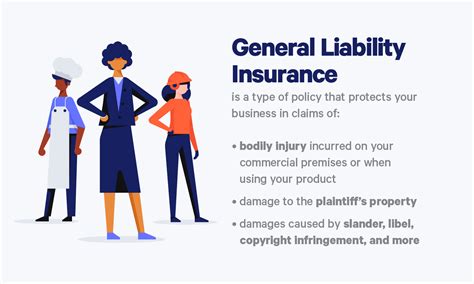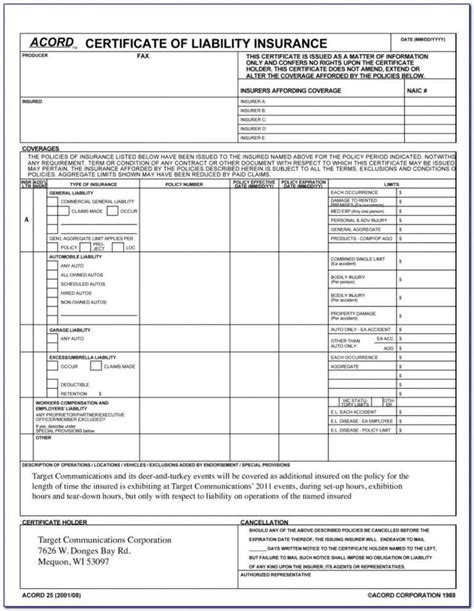Liability Of Insurance

Insurance is an essential tool for managing risks and protecting individuals, businesses, and assets from potential financial losses. However, with the complex nature of insurance contracts and the ever-evolving legal landscape, understanding the liability aspects is crucial for all parties involved. This article aims to delve into the intricacies of insurance liability, exploring the responsibilities, risks, and potential consequences for both policyholders and insurance providers.
Understanding Insurance Liability: An Overview

Insurance liability refers to the legal obligations and responsibilities that arise from insurance contracts. When an individual or entity purchases an insurance policy, they enter into a legal agreement with the insurer, outlining the terms and conditions of coverage. This agreement dictates the rights and duties of both parties, particularly in the event of a claim or dispute.
Insurance liability can be a complex and multifaceted topic, as it encompasses various aspects, including policy interpretation, claims handling, and the legal implications of non-compliance. It is essential to recognize that insurance liability is not solely a matter of financial compensation but also involves legal accountability and ethical considerations.
Key Components of Insurance Liability
To grasp the concept of insurance liability fully, it is crucial to understand its key components:
- Policyholder’s Obligations: Policyholders have a responsibility to accurately disclose relevant information during the application process and adhere to the terms of the policy. This includes timely premium payments and providing truthful and complete answers to any questions asked by the insurer.
- Insurers’ Duties: Insurance companies have a legal and ethical obligation to act in good faith, providing fair and reasonable coverage to their policyholders. This entails prompt claim processing, accurate policy interpretation, and honest communication throughout the insurance relationship.
- Claims and Disputes: Insurance liability often comes into play when claims are filed. Policyholders must prove their losses and demonstrate that they have fulfilled their obligations. Insurers, on the other hand, must assess claims fairly and make timely payments when warranted.
- Legal Consequences: Non-compliance with insurance policies or acts of bad faith can lead to significant legal consequences. Policyholders may face penalties for misrepresentation or fraud, while insurers may be held liable for failing to uphold their contractual obligations or engaging in unfair practices.
Exploring Policyholder Liability

Policyholders, as the beneficiaries of insurance coverage, have specific responsibilities and liabilities that they must understand and fulfill. These liabilities can vary depending on the type of insurance and the jurisdiction in which the policy is issued.
Disclosure and Warranty
One of the fundamental aspects of policyholder liability is the duty of disclosure and warranty. When applying for an insurance policy, policyholders must provide accurate and complete information about the risks they wish to insure. Failure to disclose relevant facts or providing misleading information can lead to severe consequences, including policy cancellation, denial of claims, or even legal penalties.
For instance, consider a homeowner's insurance policy. If a policyholder fails to disclose a known structural defect in their home during the application process, and that defect later causes significant damage, the insurer may argue that the policyholder breached their duty of disclosure. This could result in the insurer denying the claim, leaving the policyholder financially responsible for the repairs.
| Disclosure Liability Examples | Consequences |
|---|---|
| Omitting a previous car accident | Claim denial for related injuries |
| Failing to disclose pre-existing medical conditions | Policy cancellation or higher premiums |
| Misrepresenting business income | Financial loss due to claim rejection |

Premium Payment and Timely Reporting
Policyholders are also responsible for timely premium payments. Failure to pay premiums can result in policy cancellation, leaving the individual or business uninsured. Additionally, policyholders must promptly report any losses or incidents covered by the policy to the insurer. Delayed reporting can impact the insurer’s ability to investigate and assess the claim, potentially leading to claim denials or reduced payouts.
In a real-life scenario, a business owner who fails to report a cyberattack promptly may face difficulties when filing a claim for data breach expenses. The insurer may argue that the late reporting compromised their ability to conduct a thorough investigation, resulting in a reduced payout or even claim denial.
Insurer Liability and Good Faith
Insurance providers have a legal and ethical duty to act in good faith when dealing with their policyholders. This principle of good faith, known as uberrimae fidei in legal terms, requires insurers to provide fair and honest treatment throughout the insurance process, from policy issuance to claim settlement.
Prompt Claims Handling
One of the critical aspects of insurer liability is the timely handling of claims. Insurers must process claims efficiently and make reasonable efforts to investigate and assess the validity of the claim. Delays in claim processing can cause significant financial distress to policyholders, especially in cases of emergency or urgent needs.
For example, imagine a homeowner whose home sustains significant water damage due to a burst pipe. The policyholder promptly files a claim, expecting a swift resolution. However, if the insurer fails to respond or delays the claim process, the policyholder may face challenges in securing the necessary repairs and could incur additional expenses.
Accurate Policy Interpretation
Insurance policies are often complex documents, and their interpretation can be a source of disputes. Insurers have a responsibility to interpret policies fairly and in the best interest of their policyholders. Misinterpreting policy terms or using vague language to deny claims can result in legal repercussions and damage the insurer’s reputation.
Consider a life insurance policy with a specific clause regarding suicide exclusions. If the insurer misinterpreted the clause to deny a claim for a beneficiary, it could lead to a legal battle and negative public perception. Accurate policy interpretation is crucial to maintaining trust between insurers and policyholders.
Legal Consequences and Bad Faith
When either party, whether the policyholder or the insurer, fails to uphold their obligations, legal consequences may arise. Bad faith practices, such as misrepresentation, fraud, or intentional delay of claims, can lead to significant penalties and legal action.
Policyholder Penalties
Policyholders who engage in fraudulent activities, such as inflating claims or providing false information, can face severe penalties. These penalties may include criminal charges, civil lawsuits, and the cancellation of their insurance policies. In some cases, policyholders may also be required to repay any benefits received fraudulently.
A case study involving a fraudulent insurance claim highlights the severity of such actions. An individual who staged a car accident to receive insurance benefits was not only charged with insurance fraud but also faced additional legal consequences, including a prison sentence and the obligation to repay the insurance company.
Insurers’ Legal Exposure
Insurers who act in bad faith or fail to uphold their contractual obligations may face legal action from policyholders. This can include lawsuits for breach of contract, bad faith claims, or even class-action lawsuits if the insurer’s practices affect a large number of policyholders.
A well-known example of insurer bad faith practices is the case of Allstate Insurance Co. vs. Parham. The insurer was accused of systematically denying or underpaying claims to policyholders, leading to a class-action lawsuit and significant financial penalties. This case serves as a reminder of the potential legal risks insurers face when they fail to act in good faith.
Future Implications and Regulatory Changes

The landscape of insurance liability is constantly evolving, influenced by technological advancements, changing consumer expectations, and regulatory reforms. As the insurance industry adapts to these changes, policyholders and insurers must stay informed to navigate the complexities effectively.
Digitalization and Insurance
The rise of digital technologies and online insurance platforms has transformed the way policies are purchased and claims are filed. While digitalization offers convenience and efficiency, it also presents new challenges and potential liabilities. For instance, cybersecurity risks and data breaches can impact both policyholders and insurers, leading to financial losses and legal consequences.
As the insurance industry embraces digitalization, it is essential to implement robust cybersecurity measures and educate policyholders about online security practices. Failure to do so may result in increased liability for insurers and potential privacy breaches for policyholders.
Regulatory Reforms and Consumer Protection
Governments and regulatory bodies play a crucial role in ensuring fair practices and consumer protection within the insurance industry. Regulatory reforms often aim to enhance transparency, standardize policies, and protect policyholders from abusive practices. These reforms can have a significant impact on insurance liability and the overall industry landscape.
For example, the implementation of the European Union's General Data Protection Regulation (GDPR) had a far-reaching effect on the insurance industry. Insurers had to adapt their data handling practices to comply with the regulation, ensuring the protection of policyholders' personal information. Non-compliance with such regulations can result in hefty fines and legal repercussions.
Conclusion
Insurance liability is a complex and dynamic field, requiring a deep understanding of legal obligations, ethical considerations, and evolving industry practices. Both policyholders and insurers must remain vigilant and informed to navigate the potential risks and liabilities effectively.
By staying informed about their rights and responsibilities, policyholders can make informed decisions when purchasing insurance and filing claims. Insurers, on the other hand, must prioritize good faith practices and fair treatment to maintain trust and avoid legal pitfalls.
As the insurance industry continues to evolve, staying up-to-date with regulatory changes and embracing technological advancements will be crucial for all stakeholders. This article has provided an in-depth exploration of insurance liability, offering valuable insights to navigate the complex world of insurance with confidence and awareness.
What are the common causes of insurance liability disputes?
+Insurance liability disputes can arise from various factors, including policy interpretation differences, claim denials, delayed payments, and non-disclosure of relevant information. These disputes often occur when there is a perceived breach of contract or a failure to act in good faith by either the policyholder or the insurer.
How can policyholders protect themselves from insurance liability risks?
+Policyholders can take several steps to minimize insurance liability risks. Firstly, they should thoroughly understand their policy terms and conditions, ensuring accurate disclosure of all relevant information. Regularly reviewing and updating policies can also help mitigate risks. Additionally, policyholders should promptly report any incidents and maintain open communication with their insurers.
What are the potential consequences of insurer bad faith practices?
+Insurers who engage in bad faith practices, such as unreasonable claim denials or delays, may face significant legal and financial consequences. These can include lawsuits, regulatory fines, and damage to their reputation. Policyholders affected by bad faith practices may also be entitled to additional compensation beyond the initial claim amount.



